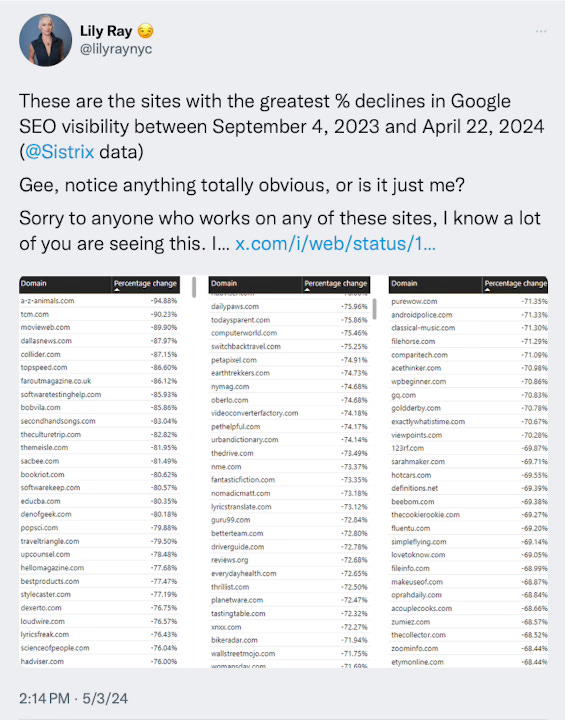Last week, Search Engine Optimization (SEO) expert Lily Ray noticed a surprising drop-off across a bunch of websites between September 2023 and April 2014. Check it out:
This jumped out to me partially because of the decline, but also because I worked for two of the companies in the top five drop-offs: Turner Classic Movies and Collider.
The TCM drop-off isn’t really that big of a deal. It’s not great that people can’t find the stellar articles or other content on the TCM site easily through Google, but as a business, TCM doesn’t rely on Google-driven traffic. It’s one of those things where if I was still with TCM, I’d look into adjusting how we operate the backend of the site, but a major overhaul wouldn’t be prudent since the website is a minor aspect of TCM’s operations.
If I were still at Collider, I’d be freaking out at an 87.15% drop off in eight months. That’s the kind of drop that could mean the end of a site that has now entirely geared its operations to SEO. Before Valnet purchased Collider, SEO was important to us, but we sought to balance it with reliable articles and commentary so that a dedicated readership would come to the site directly. It was always an uphill battle, but by trying to remain balanced across Google, social-driven traffic, and direct traffic, we weren’t putting all of our eggs in one basket. Valnet, which specializes in programmatic ads (ads specialized towards the user based on their browsing history as opposed to general ad buys where a company says, “Hey, we want to buy up all the banner ads on your site this weekend for our product”), relies heavily on SEO because they’re a volume-based business. They want as many articles as possible so that they’ll rank higher on Google for a plethora of search terms. The higher you rank on Google, the more likely people will click on your article, and when people click over to the page, the programmatic ad dollars roll in.
Setting aside my personal qualms with this approach (you can’t really do quality at scale, so while there was a massive increase in articles, there was a decrease in quality, not because any individual writer was “bad” but because that’s just the trade-off; the high-end restaurant works differently than a fast food chain), Ray’s findings show the key pitfall of this strategy: you’re relying heavily on Google, and they can change everything without notice. Every website can gear its appearance and content to appease Google, but the second Google changes its algorithm, your entire business plan can fall out from under you. It would be like building a gas station by the interstate, and business is booming, but one morning you wake up and the interstate is gone.
It’s not that SEO is inherently bad. You want reliable websites to be at the top of search rankings, and since the online ad market is such a disaster (Google and Facebook dominate online advertising, which means individual websites fight for table scraps), you’re trying to do what you can to get any traffic that you can. If that means emphasizing certain keywords in your webpage title or trying to reach a certain word count, then those feel like manageable adjustments in the same way that dressing nicely for an event may make you appear more approachable.
And yet for all the work done on the part of the websites (work I’ve seen and performed first-hand), it only takes a small adjustment on the part of Google to send you scrambling. Furthermore, all the SEO work starts to become moot as Google absorbs your work into its own search results. “Best Movies on Netflix” used to be one of Collider’s best-performing articles, and while now every entertainment website has gotten in on that article, it’s fairly moot. Type that search into Google now and you’ll see movies listed at the top rather than links to a website. As Google leans more into AI, which itself is simply scraping other websites for its information, there will be less reason to go to the top search result if Google displays the answer right on the search page. For Google, this makes sense since they want the search process to be as seamless as possible, but it’s death for the sites that need you to click over to their page.
I understand why companies still want SEO gurus, but that approach feels behind the times. Search-based traffic is already a dicey game, and it will become an outright losing one as Google seeks to replace search engine results with AI-generated results (whether those AI results are correct or not). For too long, big tech has tried to convince media companies that if you play by big tech’s rules, you’ll share in the rewards, but that’s an empty promise. You may as well ask Darth Vader to stick to the terms of the deal.
Critics of the subscription-based model argue that it will just be a bunch of publications competing against each other, and that’s a fair critique. However, I have far more control over the levers I can pull on my newsletter (e.g. pricing, recommendations, content) rather than hoping that my entire output conforms to how Google wants my publication to perform at a particular moment. While there are still macro risks on any newsletter platform (like changing the terms of service, recommendation algorithms, etc.), I still own everything I’m publishing on my newsletter, I can export and move to a different platform, and still retain editorial oversight rather than change my entire mission because I’m trying to compete on the algorithmic determination from a company that doesn’t know or care if I exist.
While I know there’s a sense of satisfaction that comes from being able to “game the system” with SEO-based content that puts your results ahead of others, players should remember they have little control over the game or the system. Your strategy is now subject to what Google decides, and that will always be a losing proposition because it’s a partnership where you give them everything and they owe you nothing.






Hitting the nail on the head once again!